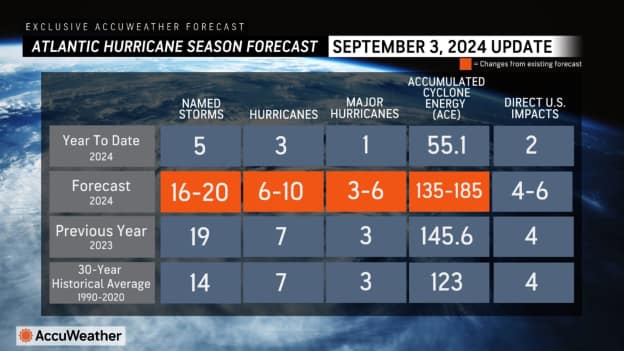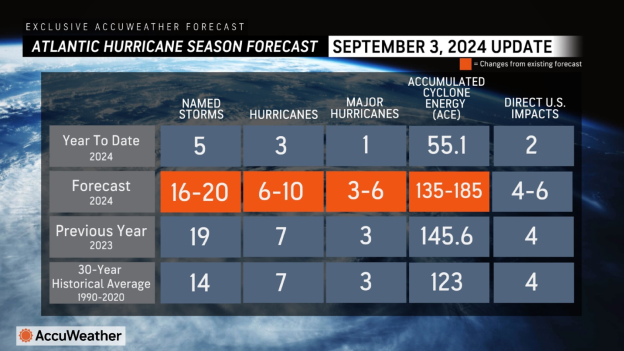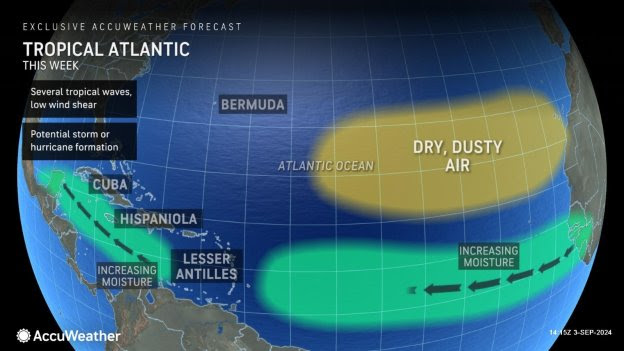
AccuWeather Global Weather Center – Sept. 3, 2024 – Following an unusual August with limited tropical activity in the Atlantic basin, as well as the first Labor Day weekend without a named storm in decades, AccuWeather is the first known source to reduce the forecast for number of named storms, hurricanes and major hurricanes during the 2024 Atlantic Hurricane season.
AccuWeather is now forecasting;
- 16-20 named storms
- 6-10 hurricanes
- 3-6 major hurricanes
- 4-6 direct impacts to the United States
AccuWeather is the only source that has continually issued hurricane season forecast updates since AccuWeather’s first forecast was issued in March, ahead of other known sources.

Today’s updated forecast from AccuWeather expands on the unique insight exclusively provided by AccuWeather last Thursday, ahead of other knowns sources, when AccuWeather Chief Meteorologist Jon Porter said “should the current lull continue deeper into September, reductions in the forecast number of named storms will be needed because a longer time period in the core of the hurricane season will have been devoid of named storms.”
AccuWeather’s forecast revision of 16-20 named storms is above the historical average of 14 named storms in the Atlantic basin.
“AccuWeather meteorologists are constantly monitoring, refining and integrating new data into our predictions. Today’s update is based on such constant scrutiny of our seasonal hurricane forecast. AccuWeather is committed to providing the most accurate and up-to-date forecasts. Our team has been integrating the latest data and insights, while monitoring the unusual conditions that have hampered the development of tropical storms and hurricanes last month. AccuWeather was the first source to issue a hurricane season forecast in March. We warned that Texas, the Florida Panhandle, South Florida, and the Carolinas faced a higher-than-average risk of direct impacts this season. Three of those four areas have already verified this season. Hurricane Beryl made landfall along the Texas coast in July. Hurricane Debby hit the Big Bend region of Florida in August, followed by a second landfall as a tropical storm in South Carolina,” Porter explained. “It has already been a very impactful and destructive hurricane season. AccuWeather experts issued a preliminary estimate of the total damage and economic loss from Hurricane Beryl in the United States of $28-32 billion. AccuWeather’s preliminary estimate of the total damage and economic loss from Hurricane Debby in the United States is $28 billion.”
AccuWeather Lead Hurricane Expert Alex DaSilva says it is very uncommon to not have a named storm in the Atlantic basin over the Labor Day Holiday weekend. Records show the last time there was not a tropical storm in the Atlantic basin between Aug. 21 to Sept. 2 was in 1997.
“There has been usual and abundant amounts of dry air and Saharan dust in the Atlantic basin throughout August. The progression to a La Niña pattern has been slower than expected, causing more wind shear. We’re also monitoring a large pocket of cold water off the western coast of Africa that is disrupting the tropical wave train,” DaSilva explained. “Extremely warm waters across much of the Atlantic basin area ideal for tropical development and rapid intensification, but the surge of dry air, dust, wind shear, and cold waters off the coast of Africa have prevented most tropical waves from developing into a tropical storm or a hurricane.”

AccuWeather expert meteorologists are urging families, businesses, emergency officials and government leaders to restock emergency supplies that may have already been used this season and to be prepared for additional tropical impacts.
“We don’t want anyone to let their guard down even though we are now forecasting fewer storms in total. We expect two to four more direct impacts to the United States this season. It only takes one powerful hurricane or slow-moving tropical storm to threaten lives and cause devastation. With such extremely warm waters in much of the Atlantic basin, and more conducive conditions for tropical development expected in the coming weeks, it’s important that everyone is prepared for the threat of more storms this year,” Porter said. “The water is incredibly warm near many coastal cities in the United States. Those warm waters can act like jet fuel and help brewing storms explode in intensity. Rapid intensification near the coast is a major concern this fall.”
2024 Atlantic Hurricane Season Impacts
Several major records have already been shattered this hurricane season. DaSilva says Beryl was the earliest major hurricane on record to form east of the Lesser Antilles in June. Beryl was also the earliest Category 5 hurricane to form and the fastest-moving Category 5 hurricane on record.
Beryl caused catastrophic damage in the Windward Islands and then impacted the Yucatan Peninsula of Mexico before making a third landfall in Texas on July 8. Beryl slammed the Gulf Coast and knocked out power to millions of Texans, leaving people without electricity and air conditioning for days. Beryl spun up dozens of tornadoes as it moved inland and resulted in serious flash flooding into Northern New England. Tornado damage was reported in upstate New York, roughly 1,400 miles away from where the storm made landfall in Texas. AccuWeather’s preliminary estimate of the total damage and economic loss from Hurricane Beryl in the United States is $28-32 billion.
One month later, Hurricane Debby blasted Florida’s Big Bend region on the Gulf Coast, moved inland and entered the Atlantic before making a second landfall as a tropical storm in South Carolina. Debby unleashed torrential rainfall and caused widespread flooding from the Carolinas to Pennsylvania and upstate New York. AccuWeather’s preliminary estimate of the total damage and economic loss from Hurricane Debby in the United States is $28 billion.
The peak of the Atlantic hurricane season is Sept. 10, and the Atlantic hurricane season officially ends on Nov. 30.
Porter says tropical threats could extend through November and possibly into December this year, due in part to extremely warm water temperatures.
“Seasonal hurricane forecasting overall still has lower skill than the high level of skill, especially AccuWeather meteorologists have, in forecasting a hurricane track and intensity once it actually develops,” Porter explained. “Some of the factors AccuWeather experts have identified as limiting the number of tropical storms and hurricanes thus far this season are not yet fully understood by anyone from a science, predictability, and forecast skill perspective weeks or months in advance have clearly been impacting this hurricane season. As always, AccuWeather remains committed to ensuring you have the most accurate and up-to-date forecasts at all times. We analyze and update our hurricane seasonal forecast more frequently than any other source, integrating the latest data combined with the insights of our expert AccuWeather Hurricane Center forecasters who have closely monitored the unusual conditions that have hampered the development of tropical storms and hurricanes.”
Advertise with the mоѕt vіѕіtеd nеwѕ ѕіtе іn Antigua!
We offer fully customizable and flexible digital marketing packages.
Contact us at [email protected]
















